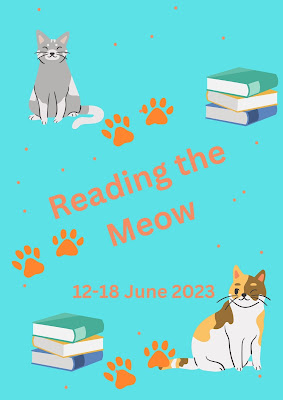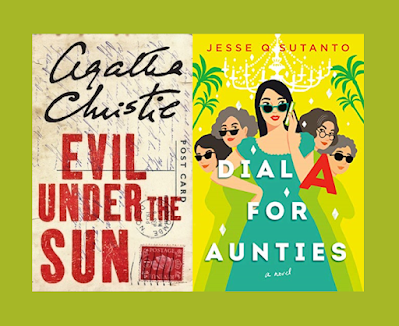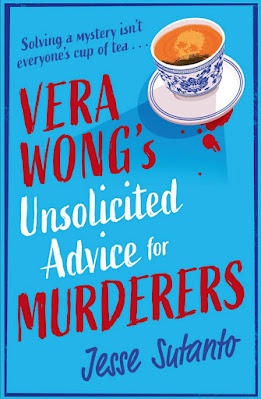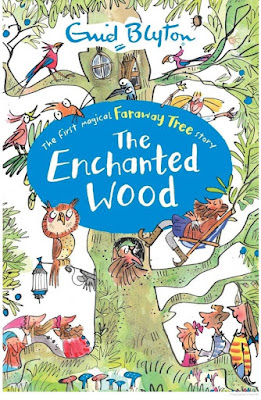I was having an
eleven-days-holiday, while our Moslem fellows are celebrating Eid. I've been
meaning to re-read Enid Blyton's adventure books. You see, her books had been
my childhood excitement, and it'd be perfect for holiday read. Then I found
this audiobook of
The Faraway Tree narrated by
Kate Winslet! I'm not usually
keen to read fantasy, but a children book in Kate Winslet's voice... I can
hardly say no!
The Faraway Tree contains of four
books - three novels and one short stories. Winslet only narrated the first
three novels, so those were what I picked. These are mini reviews of them:
#1: The Enchanted Wood
Joe, Beth, and Frannie moved with
their father and mother to a cottage in the country. There's a wood behind it,
called The Enchanted Wood, where the trees whisper to each other. There they
meet some elves, whose bag is robbed by a gnome. The children chase the gnome,
but he runs away up an enormous tree. It's the magical Faraway Tree! Its top
branches reach through the clouds, to the magical land that keeps changing.
Once a land leaves the entrance hole of Faraway Tree, it will never return, and
another land will then appear.
Up the Faraway Tree the children
climb, and meet various sort of creatures. Some were rude, but the others are
kind and friendly, such as Silky, a fair fairy with silky golden hair; the deaf
Saucepan Man, a funny little man with saucepans and kettles hung all around his
body; and MoonFace, the most amiable of them all, whose face is round and shiny
like the moon. They all live along the Faraway Tree; their tiny houses are
carved inside the trunk. I love MoonFace's house most because of the slippery
slip! It's a hole in the middle of the trunk, down which one can slide through
to the bottom of the tree. Fancy sliding down a tree!
With them, the three children
embarked on delightful adventure after adventure through different lands.
Sometimes they're dreadful enough (The Ice and Snow, the Roundabout Land) but
sometimes they're really fun (Land of take-what-you-want, and Land of
Birthdays). Their most exciting adventure was helping their new friends when
The Faraway Tree was invaded by a group of Red Goblins.
#2: The Magic Faraway Tree
Rick is a cousin of Joe, Beth, and
Frannie, who comes to stay with them as his mother is ill. He's a boisterous
and greedy boy, the same age as Joe. He is skeptical about the Enchanted Wood
at first, but soon is so excited to be in a magical adventure. So the three
children take him to the Faraway Tree, and he comes along to several more of
their adventures with MoonFace, Silky, and Saucepan Man on whichever strange
lands happen to come on top of the tree.
My (and their) favorites are Land
of the Goodies (reminds me of Hansel and Gretel with edible houses and all);
and Land of do-what-you-like (whatever you wish to do, it happens immediately,
like riding an elephant or wading on the beach). The most annoying is perhaps
the Land of Dame Snap - what a wicked lady she is!
But the most thrilling one so far
must be in the Land of Spells. They certainly are in a pickle there, and but
for the clever help from Watsizname, the Angry Pixie, and Dame Washalot - who
were angry to them often before, but came to help anyway - they might not have
returned safely to their homes!
#3: The Folk of the Faraway Tree
A friend of the children's mother
asked her to take care of her daughter, Connie, because she (Connie's mother)
is ill. How convenient it is the practice of sending one's children to friends
or relatives when they're ill! Anyway, Connie is a dainty, curious, spoilt girl
who likes to prying at others' secret. She didn't believe at first of the
Enchanted Wood and Faraway Tree. The tree folks don't like her, and the Saucepan
Man in particular is often rude to her. But after some adventures in several
lands: the Land of Marvels, the Giant Land (on the top of Jack's the
beanstalk!), the Land of Nursery Rhyme, etc. Connie becomes quite an ordinary
girl, and believes at last of the Faraway Tree.
Connie gets her most valuable
lesson when she's listening to something she oughtn't at the Land of Secrets.
She gets a spell that's taken her voice. Then they all go to the Land of
Enchantments where MoonFace and Silky got enchanted. Luckily Saucepan Man
quickly sets them and Connie free by his mother's spell, and they landed down
again at the Faraway Tree just a split second before the Land moves away!
The last and most exciting
adventure of the children and tree folks is when an army of trolls attack the
roots of the Faraway Tree to dig for jewels, that the leaves gets withered, and
the tree is dying. This is the most serious thing, and now the children, the
tree folks, and the woodland creatures will join forces to save their beloved
tree!
******
As always, Enid Blyton never
disappoints in bringing the most exciting adventures we could imagine. It was
delightful to read. And I guess, it's a perfect educational story too for
children. In particular the symbiotic mutualism relationship between the tree
folks and the Faraway Tree itself. The tree has given food and shelter to the
folks, so when it is dying, the folks courageously fought its enemy. In return,
the tree grew the best fruits the folks have ever tested. It's a good way to teach
children to respect nature.
All in all, it has been an
enjoyable reading and fantastic holiday. Once again, thank you Enid Blyton!
Rating: 4 / 5























.jpeg)
.jpeg)
















.jpeg)


.jpeg)
